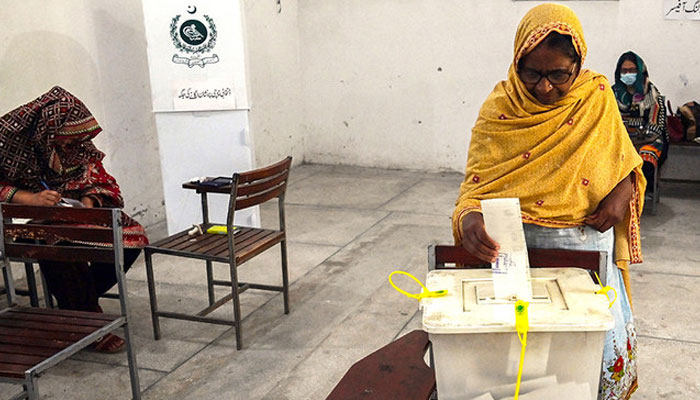By-poll verdict
Ruling party emerged victorious in by-elections and as per unofficial results has won at least two out of five NA seats up for grabs and 10 out of 16 seats across three provincial legislatures
Sunday’s by-elections may not have created much buzz, but were an important exercise for all political parties, especially for the PML-N in Punjab where it has a government. The ruling party emerged victorious in the by-elections and as per the unofficial results has won at least two out of the five NA seats up for grabs and 10 out of the 16 seats across three provincial legislatures – Punjab, Khyber Pakhtunkhwa and Balochistan. PPP, PTI-backed Sunni Ittehad Council (SIC), Istehkam-e-Pakistan Party, PML-Q have all won one seat each in the provincial assemblies. The PTI suffered a major upset in Bajaur where independent candidate Mubarak Zeb won from the NA-8 Bajaur constituency defeating PTI nominee Gul Zafar Khan. Zeb also won the provincial PK-22 seat in Bajaur against the Jamaat-e-Islami’s Abid Khan. Mubarak Zeb is the brother of slain independent candidate Rehan Zeb, who was killed before the February 8 general elections. With the by-elections done, the PML-N is celebrating its resounding victory while the PTI is again alleging rigging. To that the PML-N has said it is the PTI’s failure alone that it didn’t manage to motivate its supporters enough to come out and vote. However, the PTI is claiming that polling staff was coerced.
While it is too early to say much on the rigging allegations, political analysis offers more on why the PTI may have lost. For one, it could be the now-glaring disputes between party leaders while PTI founding chairman Imran Khan remains behind bars. The sparring between different groups in the PTI is no secret and some scandals have emerged in recent months, particularly after the February 8 polls on how the party is being managed. There are said to be groupings in the Punjab leadership as well as in KP. Many PTI leaders have criticized their own party for ignoring a political worker like Mubarak Zeb in favour of an ‘electable’ in Bajaur when it came to awarding party tickets. Another reason could be the results of the general elections and the rigging allegations that may have demotivated party supporters to come out and vote. Additionally, the PML-N has a comfortable majority in Punjab Assembly and voters usually want a candidate who is in the ruling party to win so that their issues are addressed properly instead of voting for the opposition candidate who may not be of much help. Of course, there are many factors that could have led to this. It is becoming quite clear now that the PTI may have missed an opportunity by not forming the federal government with the PPP when it had a chance.
It is important now more than ever for political parties to sit together and form a mechanism that ensures free and fair elections so that no party alleges rigging in the future. There have hardly been any elections that have not been controversial in Pakistan but the past two elections – 2018 and 2024 – have another added layer to the chaos – the ‘hybrid’ system. If this system continues and becomes permanent, it may disenfranchise the voters. The PTI has so far refused to talk to the PPP and the PML-N but maybe it’s time for them to understand the realities and initiate a dialogue for the survival of the democratic system.
-
 Caleb McLaughlin Shares His Resume For This Major Role
Caleb McLaughlin Shares His Resume For This Major Role -
 King Charles Carries With ‘dignity’ As Andrew Lets Down
King Charles Carries With ‘dignity’ As Andrew Lets Down -
 Brooklyn Beckham Covers Up More Tattoos Linked To His Family Amid Rift
Brooklyn Beckham Covers Up More Tattoos Linked To His Family Amid Rift -
 Shamed Andrew Agreed To ‘go Quietly’ If King Protects Daughters
Shamed Andrew Agreed To ‘go Quietly’ If King Protects Daughters -
 Candace Cameron Bure Says She’s Supporting Lori Loughlin After Separation From Mossimo Giannulli
Candace Cameron Bure Says She’s Supporting Lori Loughlin After Separation From Mossimo Giannulli -
 Princess Beatrice, Eugenie Are ‘not Innocent’ In Epstein Drama
Princess Beatrice, Eugenie Are ‘not Innocent’ In Epstein Drama -
 Reese Witherspoon Goes 'boss' Mode On 'Legally Blonde' Prequel
Reese Witherspoon Goes 'boss' Mode On 'Legally Blonde' Prequel -
 Chris Hemsworth And Elsa Pataky Open Up About Raising Their Three Children In Australia
Chris Hemsworth And Elsa Pataky Open Up About Raising Their Three Children In Australia -
 Record Set Straight On King Charles’ Reason For Financially Supporting Andrew And Not Harry
Record Set Straight On King Charles’ Reason For Financially Supporting Andrew And Not Harry -
 Michael Douglas Breaks Silence On Jack Nicholson's Constant Teasing
Michael Douglas Breaks Silence On Jack Nicholson's Constant Teasing -
 How Prince Edward Was ‘bullied’ By Brother Andrew Mountbatten Windsor
How Prince Edward Was ‘bullied’ By Brother Andrew Mountbatten Windsor -
 'Kryptonite' Singer Brad Arnold Loses Battle With Cancer
'Kryptonite' Singer Brad Arnold Loses Battle With Cancer -
 Gabourey Sidibe Gets Candid About Balancing Motherhood And Career
Gabourey Sidibe Gets Candid About Balancing Motherhood And Career -
 Katherine Schwarzenegger Shares Sweet Detail From Early Romance Days With Chris Pratt
Katherine Schwarzenegger Shares Sweet Detail From Early Romance Days With Chris Pratt -
 Jennifer Hudson Gets Candid About Kelly Clarkson Calling It Day From Her Show
Jennifer Hudson Gets Candid About Kelly Clarkson Calling It Day From Her Show -
 Princess Diana, Sarah Ferguson Intense Rivalry Laid Bare
Princess Diana, Sarah Ferguson Intense Rivalry Laid Bare




